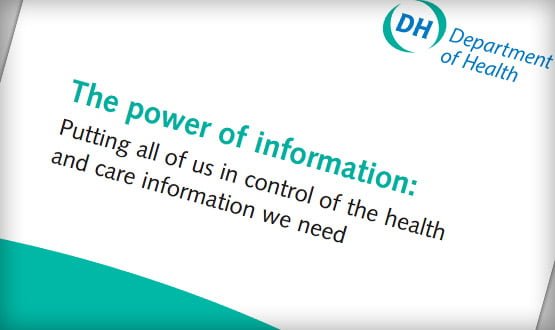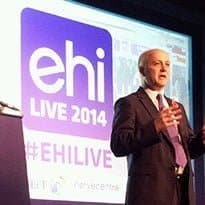Carl Reynolds on The Power of Information
- 4 July 2012

Last month saw the publication of the eagerly awaited NHS information strategy. With the ‘Liberating the NHS’ reforms now taking shape on the ground, the document may well be the final word on IT from the Department of Health.
So it was with considerable interest that I finally sat down to read ‘The Power of Information.’
Some things are good
The document sets out a ten-year framework that aims to be high-level and focussed on the needs of NHS IT users.
It comprehensively describes the need for better use to be made of information in the NHS, outlines plans to create some portals and to give patients electronic access to their GP records by 2015, and discusses the importance of standards.
I welcome the strategy’s recognition that all is not well in the world of NHS IT, and that in a digital and user-focussed world the current NHS IT offering does not rise to the challenge and delight.
Rather, it frequently fails to meet the expectations of patients and healthcare professionals alike.
It is also good that the strategy recognises things could be better, and that, for example, "using digital and online services can simplify the more routine aspects of care, such as booking appointments, requesting repeat prescriptions, or self-assessment for social care.”
Some things never change
Having said that, a comparison of the new information strategy with the 2002 Downing Street briefing for a “strategy for modernising NHS information systems” reveals a significant overlap between the two documents.
Successive governments have recognised the power of information; but there has been little progress.
The latest strategy is peppered with examples of IT projects in the NHS. Some excellent open source projects such as Renal PatientView are mentioned.
But, unfortunately, no attempt is made to discriminate between the quality of projects and they are presented as though they were all of equal value.
I have a number of other major and four minor concerns with respect to the strategy.
Major Concerns:
- The strategy does not recognise or address that the NHS IT market is fundamentally broken. Patients and NHS employees who use NHS IT have little choice or influence over the technology they use. The dominant procurement and implementation model provides little incentive for suppliers to meet the needs of the people who use the software because they aren’t the ones who ‘buy it’ (either with money or by exercising choice).
- There is a continued focus on modifying the behaviour of individuals and specifying standards in the abstract, rather than on adopting rational software licensing and design principles and testing in reality. The case for the use of open source, open governance, and modern design principles is sufficiently strong, and widely accepted outside of the NHS, to be recommended.
Minor Concerns:
- The current relationship between the Department of Health, Intellect, and the major incumbent suppliers may not be helping to make for a healthy NHS IT market. Discussion of standards delivered through partnership with industry and lists of compliant vendors suggest introducing additional barriers to entry to the market.
- There is insufficient mention of the urgent need to improve the quality of data collection in the NHS – “junk in, junk out.”
- There is little mention of how the best technology in the NHS would diffuse.
- There is little evidence of genuine commitment to being evidence based both in policy and in implementation. What evidence is there for the need of an NHS portal for example and how many user visits a day would constitute success?
There is an alternative…
Fortunately, the NHS Commissioning Board, and NHS trusts under pressure to be as competitive as possible, will be able to exercise their own strategic judgement.
The recent NHS Hack Day demonstrated the value of a modern approach to NHS IT procurement. Indeed, the UK is incredibly fortunate to have a large, talented, and capable community of “geeks who love the NHS.”
The question is whether we possess the strategic intelligence and business nous needed to foster the community and recruit the best of them.
NHS Hack Day was covered by the BMJ, Radio 4, and eHealth insider, and has sparked fresh discussion of how to achieve better value for money in NHS IT procurement. The next Hack Day will be in Liverpool 22-23 September. See the nhshackday website for more details.
NHS Hack Day is organised by the software development and consultancy company that I co-founded with Ross Jones, Open Health Care UK.




